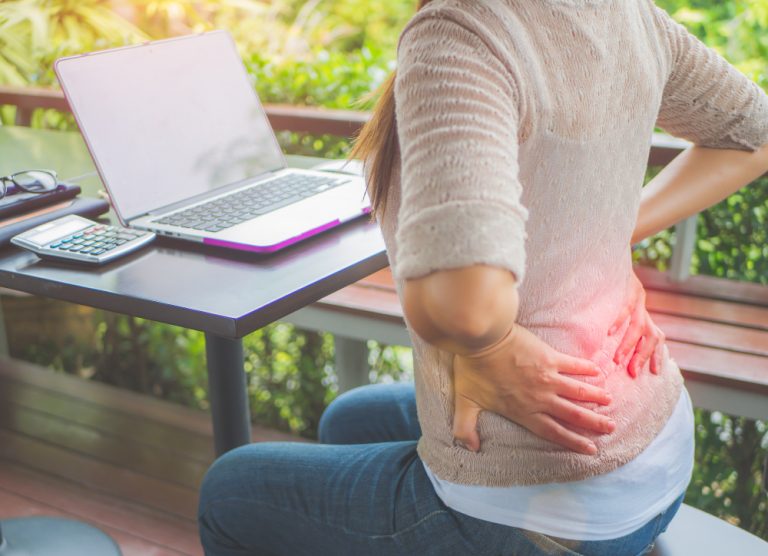Lower Back Pain: Causes, Symptoms, and How It’s Treated.
Lower back pain is a type of pain that results from many diseases and injuries, including injuries from the muscles or tendons in one’s back. This type of pain is quite common; about four out of five people will experience lower back pain sometime in their lives. While some kinds of lower back pain can be uncomfortable, others can be debilitating and severely impact your quality of life. This makes understanding and tackling lower back pain of the utmost importance.
Symptoms of lower back pain can appear gradually or suddenly, depending on the cause. The pain may also be radiating, dull, or worse when you’re in certain positions, such as bending. Common lower back pain symptoms include problems with posture, stiffness, and muscle spasms. Instead of simply living with lower back pain and letting it impact your life, you can work towards improving your health and managing your pain. This article will discuss the causes and different treatment options for lower back pain so you can better understand what steps to take to better your health.
What Causes Lower Back Pain?
There are many reasons people experience lower back pain. Some of the most common ones include age, structural problems, and weight.
Age
As you get older, your disks wear down and get weaker. As a result, you may experience lower back pain and stiffness. Individuals over the age of 30 usually suffer from lower back pain because of this.
Weight and Lifestyle
Individuals who are overweight or obese are more likely to experience lower back pain because of the increased pressure on their disks and joints. Those whose jobs require bending or heavy lifting may also suffer from increased lower back pain.
Structural Problems and Health Issues
Health plays a significant role in back pain. Living a sedentary lifestyle, excessively drinking, and smoking are all factors that increase your risk of lower back pain. When your abdominal muscles are weak and can’t support you, you can suffer from sprains and strain, resulting in back pain. Structural problems like scoliosis and ruptured disks, diseases like osteoarthritis, and mental health issues like anxiety and depression can also lead to lower back pain.
Lower Back Pain Relief Options
Fortunately, there are many different treatment options for lower back pain. The best treatment for lower back pain depends on the cause and should be discussed with a medical professional. However, rest and painkillers help with most acute lower back pain episodes. The following are some of the different treatment options you may want to look into if you suffer from lower back pain.
Preventing Lower Back Injuries and Pain
While pain from structural problems and diseases can’t be prevented, there are steps you can take to avoid injuries that cause lower back pain. Some of these are maintaining a healthy weight and taking steps to strengthen your muscles. Since excess weight can stress your disks and vertebrae, maintaining a healthy weight can help you avoid lower back pain. Additionally, you can exercise regularly to strengthen your muscles and lift with your legs instead of your back to prevent future lower back injuries.
Preventing lower back pain also includes maintaining a healthy diet and ensuring you get the proper nutrients to sustain yourself. For example, you can switch to a nutrient-rich diet or use supplements for essential nutrients like calcium and vitamin D. A doctor or dietician can help guide you on the best diet for your unique issues and lifestyle. For example, some diets include foods that cause inflammation. Eliminating these foods may be helpful when working towards eliminating lower back pain.
Prevention may also include lifestyle changes such as avoiding smoking, working on your posture, wearing flat, supportive shoes that put less strain on your back, and switching to a mattress that ensures your spine is straight, and your shoulders and buttocks are supported when sleeping.
Medication
Over-the-counter and prescription medication options can help relieve lower back pain by relaxing muscles and eliminating back spasms. These include nonsteroidal anti-inflammatory drugs (NSAIDs) such as ibuprofen and steroid injections that reduce inflammation and relieve pain. Some antidepressants can also help combat lower back pain.
Physical Therapy and Exercises for Lower Back Pain
Physical therapy is an excellent option for chronic lower back pain. In addition to strengthening muscles, physical therapy helps you avoid future injuries by improving flexibility. Physical therapy is used in conjunction with heat and ice to alleviate pain. You can also have a trained therapist use manual therapy, i.e., move the joints, muscles, and bones in your back to provide relief.
Gradually adding exercises for lower back pain into your routine can be helpful for pain management. Staying active promotes blood flow and healing. According to NHS Inform, some of the best exercises for back pain include knee rolls, pelvic tilts, single knee hugs, double knee hugs, and the cat camel. The NHS also suggests activities such as pilates, walking, yoga, and swimming to help ease back pain.
Taking Joint Health Supplements
Lower back pain can be debilitating, and leaving it untreated can significantly lower your quality of life. However, not everyone wants to go the route of medication and injections. Those who want a more natural approach may consider taking joint health supplements which can help you combat lower back pain. Flexback™ is a joint health supplement that not only helps with pain management but also supports flexibility. The bespoke mix of high-quality and research-backed ingredients such as bromelain, green-lipped mussel, and MSM (methylsulfonylmethane), helps regulate the symptoms of lower back pain and allows you to lead a healthier and pain-free life.
In addition to using high-quality ingredients, The Good Vitamin Company’s supplements are manufactured in the UK and made to GMP standards. Our vitamins are also free of common allergens, making them suitable for you, no matter your dietary restrictions. Check out our bestselling supplements here and book a free consultation with us here where our experts can help you determine which of our nutraceuticals are best suited to your needs.

